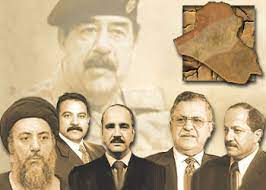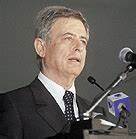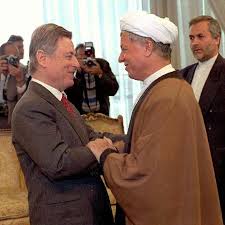Iran and Syria have agreed to sponsor a meeting of Iraqi opposition leaders in Damascus to devise a coordinated strategy for overthrowing Iraqi President Saddam Hussein, Iranian and Iraqi sources said Wednesday. An Iranian source told United Press International that about ’40 opposition leaders representing national, democratic, Muslim and Kurdish parties will be invited to come out with a program to overthrow Saddam.’ Iraqi opposition sources in Damascus said leaders at the meeting would appoint a committee to discuss proposals aimed at toppling Hussein without causing civil war. Syria had made overtures toward improving relations with Hussein since it took part in the coalition that drove Iraqi troops out of Kuwait in 1991, while Iran — which fought a war with Iraq in 1980-88 — had softened its line in recent years. But last week’s slayings of Hussein’s sons-in-law after their return from a six-month defection to Jordan convinced Syria that Iraq cannot be trusted, the sources said, while public Iranian ties to Iraq’s opposition would indicate a similar change in direction. Mashaan al-Jabbouri — head of Iraq’s rightist opposition Nation Party, who fled Baghdad in 1989 — said Iraqi Kurdish leaders Masoud Barzani and Jalal Talbani, as well as Shiite chief Baker al-Hakim, would be invited to the Damascus meeting. After a two-hour meeting with Syrian Vice President Abdel Halim Khaddam and former Iraqi intelligence chief Wafik Samarai, al-Jabbouri said the gathering would have one purpose: improving the future of Iraq. He said he would also meet Iran’s chief of intelligence, who is part of an Iranian delegation headed by Vice President Hassan Habibi negotiating with Syrian officials through Thursday in Damascus.
Al-Jabbaouri has been the first Iraqi opposition leader to address Iraq’s suppression of Shiite Muslims, the division of Islam that controls Iran but is a minority in Iraq. Al-Jabbouri apparently plans to remain in Damascus, the sources said, because Jordan recently prevented him from returning to Amman after a visit to Syria. Jordan has separately been encouraging Iraqi opposition groups. Jordan’s King Hussein said in London Tuesday that ‘when conditions reach the level they have reached in Iraq…it becomes our duty, all of us, to do what we can…for the Iraqi people.’ Al-Jabbouri said Syria gave him a ‘green light’ to open an office for his National Party in Damascus. He also said he and Wafik Samarai had been told by Khaddam that Syria is considering reopening its border with Iraq to allow Iraqi citizens to enter Syria directly. The border has been closed for more than 15 years. The opposition leaders have asked Syria to channel food and medicine to the Iraqi public through Arab and international organizations, rather than via the Iraqi government. ‘Such assistance would show the Iraqi people that the Syrian people are supporting them, and that they are not alone in their struggle against Iraq’s government,’ al-Jabbouri said. He denounced the economic sanctions that the United Nations has imposed on Iraq since its invasion of Kuwait in 1990. ‘Those who think that starving the Iraqi people will lead to the fall of the regime are mistaken,’ he said. Also in Damascus, a Saudi source expressed ‘worries and annoyance’ over deteriorating conditions in Iraq and said he hopes that the decline would not lead to civil war, ‘although all indications for this war exist now.’ King Hussein also said the key defector who returned to Iraq, Lt. Gen. Hussein Kamel al-Majid, had ‘received assurances that he could go back.’ But he ended up bringing his family back to their deaths, the king said. ‘The horror of it all is that he, his brother, his father who had remained in Iraq, and others have been murdered. Worse still, reports — not yet verified — are that many of the children have been murdered, as well,’ the king said.



